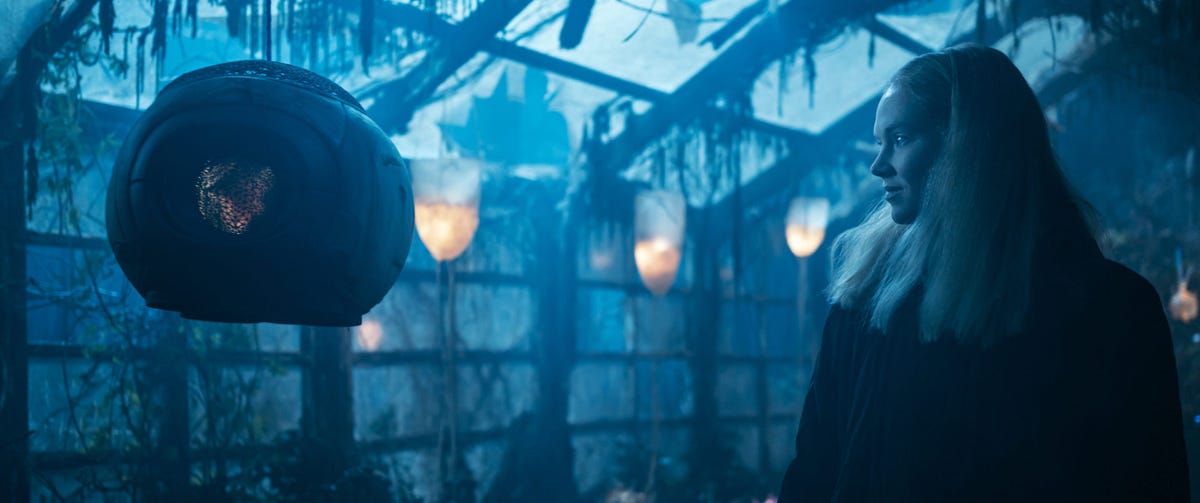[ad_1]
2022 sci-fi gem Vesper won’t strike a chord with everyone.
This dystopian-set mystery is a moving picture book, turning the pages slowly so you can absorb every delicate, wonder-inducing detail. In other words, don’t watch this if you’re after a mindless action blockbuster.
Watch it — on Netflix in the UK or rent it on Prime Video, Apple TV Plus and more — to be enveloped in an apocalyptic biopunk fairytale. Vesper looks like a fantasy lifted from the art pages of Simon Stålenhag’s Tales From the Loop. Hulking beastly monuments loom in the distance of a desolate field, shrouded in a sea of mist. A young girl and her floating orb-like droid pal scavenge the detritus. This is the setting for a dark, mysterious, beautiful fairytale the meditative will sink body and soul into.
The titular Vesper (Raffiella Chapman) is a 13-year-old botanist whose life and skills are dedicated to keeping her paralyzed father alive. She competes for junk from other collectors picking apart the remains of a decayed Earth, where meager resources are controlled by the powerful inhabitants of the Citadel.
But we live in the outskirts, in the treacherous forests and steaming swamps of an Earth clinging to life after the collapse of the ecosystem. A brilliant biohacker, Vesper is the conductor of an orchestra of colorful, almost magical plants, some of which have a hunger as frightening as the human-eating fungus in The Last of Us.
When Vesper encounters a fair-haired, almost Lord of the Rings-esque figure (Rosy McEwen), events are set into motion that lead her to sow a glimmer of hope for others her age, struggling to find light on a planet in ruin.

Camellia is a mysterious stranger who enters Vesper and her droid’s lives.
Condor Entertainments
Directors Kristina Buožytė and Bruno Samper, who also made the hypnotic 2012 sci-fi thriller Vanishing Waves, weaved in themes of beauty and resilience in the hope Vesper will keep us believing in a future, despite the state of the world. It took them years of research to build the universe, incorporating “recent innovations in organic architecture, bio-design, genetic engineering, and even the sexuality of plants.”
The result is a unique, richly-realized sci-fi dystopia with a lived-in quality, almost Andor-esque in its tactile nature. But Vesper isn’t just about atmosphere-building. A breeder of synthetic humans (Eddie Marsan) has a sinister interest in Vesper and there are moments of body horror to squirm at.
Then, floating through the darkness — a flicker of warmth, a glowing lantern carried by Vesper, followed by her old scout drone with a smiley face painted onto it. The drone’s comforting fatherly voice resonates in the hush of a graveyard world. At the rear comes the mysterious elven-looking Camellia, harboring secrets that keep the story moving forward. Vesper develops a mother-daughter bond with Camellia, a simple sentiment that lights up the gloom with a purity and innocence.

Vesper is a skilled biohacker.
Condor Entertainments
Curiously, despite the dark fairytale nature of this world, dreaming and escapism is portrayed as destructive. More valued is confronting the obstacles, no matter how harsh, reality throws at you head on. While the distant Citadel towers in its own mythology, built up by the power of storytelling, the reality of its existence is bleak.
For something a bit different to your usual blockbuster sci-fi fare, try Vesper. It feels small, earthy, contained to a handful of locations, without the overdone pontificating grandeur. It’s planted in a child’s perspective of a dystopia, quiet and nimble. And yet the breadth and scope and majesty of this world is powerful.
New Movies Coming in 2023 From Marvel, Netflix, DC and More
[ad_2]
